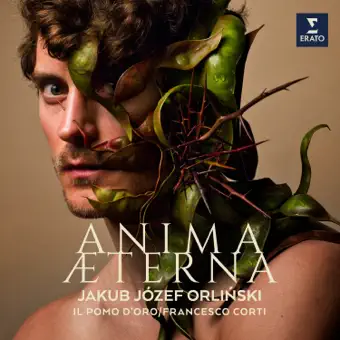Awards Issue 2021
Anima Aeterna
Jakub Józef Orliński & Il Pomo d’Oro o.l.v. Francesco Corti
We waren enthousiast genoeg over het nieuwe album van contratenor Jakub Józef Orliński om hem op de cover van vorige maand te plaatsen, en het stelt niet teleur: een werkelijk opvallende release.

Noem het een vervolg, een follow-up of een ‘parallelle reis’ (zoals onderzoeker Yannis François doet in zijn verhelderende inleidende notitie): wat je ook kiest, ‘Anima æterna’ is in hoge mate een begeleidend album van het solodebuut ‘Anima sacra’ (18/12) van de Poolse countertenor Jakub Józef Orliński. Er is geen chronologische progressie; we bevinden ons nog steeds in de sacrale muziek van de 18e eeuw – we gluren net om de hoek naar de beginjaren van de klassieke stijl in Gennaro Manna’s Laudate pueri – en spitten door minder bekende oratoria en cantates van Fux, Zelenka, Händel en meer in de hoop goud te vinden.
En dat vinden we zeker. De stem die al rijper wordt en nieuwe kleuren krijgt in ‘Facce d’amore’ (19/12) doet nu minder moeite om dat te bewijzen. Waar het eerdere album af en toe overgekookt aanvoelde, de stem te hard duwde voor dramatisch effect, is hier een gemak, een zekerheid voor Orliński's instrument. De vreugde van de stem is de soepelheid, zachtheid, iets dat wordt volgehouden door sprongen en passages van coloratuur. Er is niets van Cencic of Fagioli's gespannen spieren; in plaats van vooruit te duwen in het vocale drama, lijkt Orliński er juist achterover te leunen. Op schijf zorgt het voor een rijke luisterervaring, hoewel het interessant zou zijn om te horen hoe het zich vertaalt naar het operagebouw.
François bewijst opnieuw een overtuigende gids voor de periode, die je vanaf het begin grijpt met Zelenka's aangrijpende motet Barbara, dira, effera, waarin Orliński zichzelf schaduwbokst met een pittige fagot - slechts een van de vele stijlvolle obligato-cameo's uit Il Pomo d'Oro, karaktervol en energiek als altijd hier onder gastdirigent Francesco Corti in plaats van Emelyanychev. Het contrast met het verrukkelijke 'Non t'amo per il ciel' uit Fux' Il fonte della salute is prachtig geënsceneerd, Orliński's soepele, smoezelige toon weerkaatst in de harsachtige solo-baryton. De langzamere legato-aria's (waaronder Almeida's 'Giusto Dio' en Händels Antiphon in d mineur) zijn een hoogtepunt.
We krijgen een serieuze bonus in de toevoeging van zowel het koor als Gramophone’s nieuwe Young Artist of the Year, sopraan Fatma Said, die Orliński vergezelt voor Zelenka’s meerdelige Laetatus sum – koperachtig-helder in zijn koelere vocale tinten, nonchalant een hoge D uitwerpend. Première-opnames van Bartolomeo Nucci en Gennaro Manna zijn aantrekkelijke curiosa, die de laatste verkoop toevoegen aan een album dat Orliński versterkt als een van de meest opvallende jonge talenten, niet alleen in countertenorzang, maar in barokmuziek in het algemeen.

Call it a sequel, a follow-up or a ‘parallel journey’ (as researcher Yannis François does in his illuminating introductory note): whatever you choose, ‘Anima æterna’ is very much a companion album to Polish countertenor Jakub Józef Orliński's solo debut ‘Anima sacra’ (12/18). There’s no chronological progression; we’re still very much in the sacred music of the 18th century – just glimpsing around the corner to the beginnings of Classical style in Gennaro Manna’s Laudate pueri – sifting through lesser-known oratorios and cantatas by Fux, Zelenka, Handel and more in hopes of finding gold.
And we definitely find it. The voice already maturing and gaining new colours in ‘Facce d’amore’ (12/19) now strives less hard to prove it. Where the earlier album occasionally felt overcooked, the voice thrust too hard for dramatic effect, here there’s an ease, a security to Orliński's instrument. The joy of the voice is its suppleness, softness, something sustained through leaps and passages of coloratura. There’s none of Cencic or Fagioli’s taut muscle; rather than pushing forwards into the vocal drama, Orliński seems to lean back into it. On disc it makes for rich listening, though it would be interesting to hear how it translates to the opera house.
François once again proves a compelling guide to the period, seizing you from the start with Zelenka’s arresting motet Barbara, dira, effera, where Orliński finds himself shadow-boxing with a feisty bassoon – just one of many classy obbligato cameos from Il Pomo d’Oro, characterful and energised as ever here under guest director Francesco Corti rather than Emelyanychev. The contrast into the ravishing ‘Non t’amo per il ciel’ from Fux’s Il fonte della salute is beautifully staged, Orliński's pliable, smudgy tone echoed in the resinous solo baryton. The slower legato arias (including Almeida’s ‘Giusto Dio’ and Handel’s Antiphon in D minor) are a highlight.
We get a serious bonus in the addition of both chorus and Gramophone’s new Young Artist of the Year, soprano Fatma Said, who joins Orliński for Zelenka’s multi-movement Laetatus sum – coppery-bright to his cooler vocal shades, throwing out a top D with nonchalance. Premiere recordings from Bartolomeo Nucci and Gennaro Manna are attractive curiosities, adding the final sell to an album that reinforces Orliński as one of the most striking young talents not just in countertenor singing but in Baroque music more broadly.
